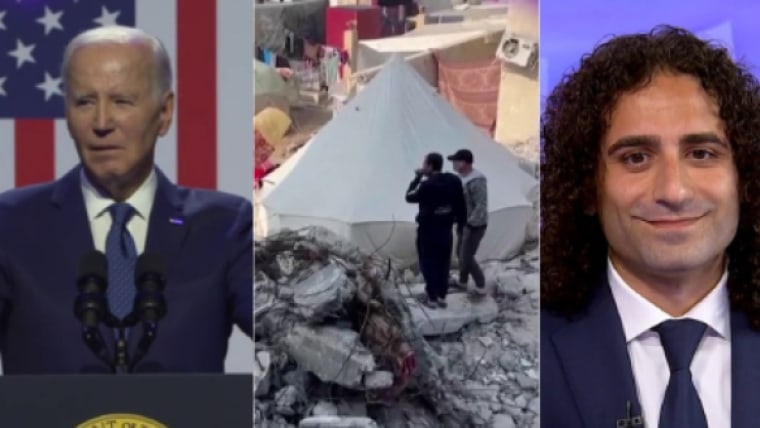Complicity.
It’s a word I’ve been thinking about a lot lately. I think a lot of people have been reckoning with what the word means in the political sphere these days, actually, whether it’s complicity in Donald Trump’s authoritarianism, complicity in racist violence or complicity in suffering felt by nations abroad.
And the word was front of mind as I watched Joy’s exclusive interview on “The ReidOut” with Tariq Habash, a senior Biden education official who said he’s resigning from the Education Department over President Joe Biden’s “complete unwillingness to demand an immediate and permanent cease-fire” in the Israel-Hamas war.
On Wednesday’s show, Habash said that Education Secretary Miguel Cardona was “extremely understanding,” “very supportive” and “extremely empathetic” after Habash submitted his resignation letter, which he posted online. (When asked by NBC News for comment, an Education Department spokesperson said: “We wish him the best in his future endeavors.”)
Habash wrote that he “cannot be quietly complicit as this administration fails to leverage its influence” to end Israel’s bombardment of Gaza.
There’s that word again: complicit.
Barack Obama used it recently while talking about the conflict himself. But the former president wasn’t talking just about the Biden administration’s complicity, a notion that I find, at times, to be an oversimplification of America’s complicated and deeply entrenched ties to Israel. He was talking about collective complicity:
And so if you want to solve the problem, then you have to take in the whole truth. And you then have to admit nobody’s hands are clean, that all of us are complicit to some degree.
As in, all people who consider or have considered themselves Americans over the last 75 years are heirs to the legacy of violence in the Middle East.
This is why I tend to reject the idea that America’s role in the current conflict is necessarily a matter of presidential politics. We’re not new to this imperialism business — we’re true to it. And the U.S. has reaped great material benefit for years from its alliance with Israel.
So although I’ve discouraged our hasty involvement in this particular outbreak of violence, and condemned the president’s resistance to a cease-fire, I’m not convinced that “abandoning” Biden politically is going to help bring about peace.
On its face, I think Habash’s resignation makes perfect sense. If you disagree with an administration’s policies and feel you’re powerless to change it from your position, you should not be part of that administration.
As for the practical ways to achieve what Habash and others, myself included, hope for — an immediate and permanent cease-fire — I think the solution is a bit more complex.
Check out the full interview below.

